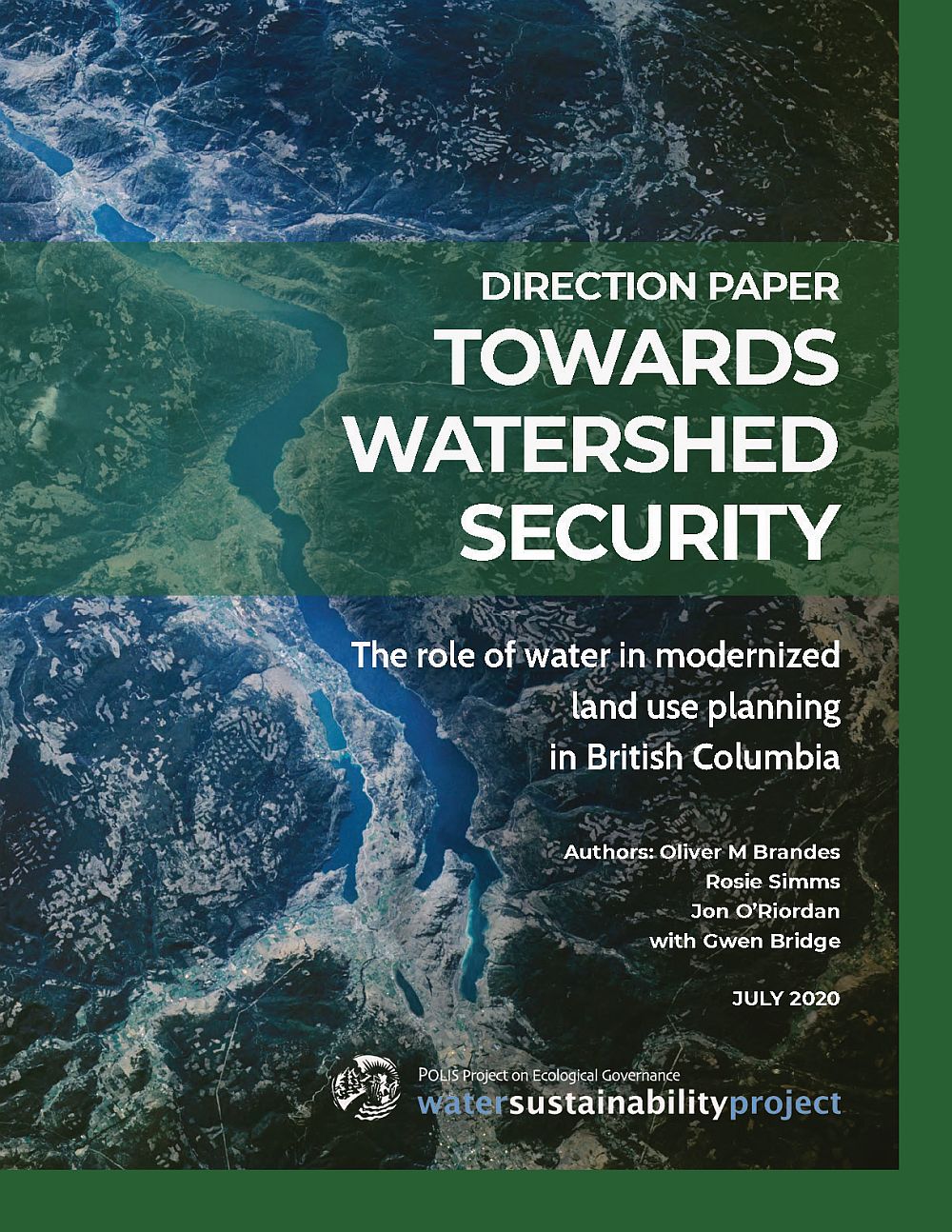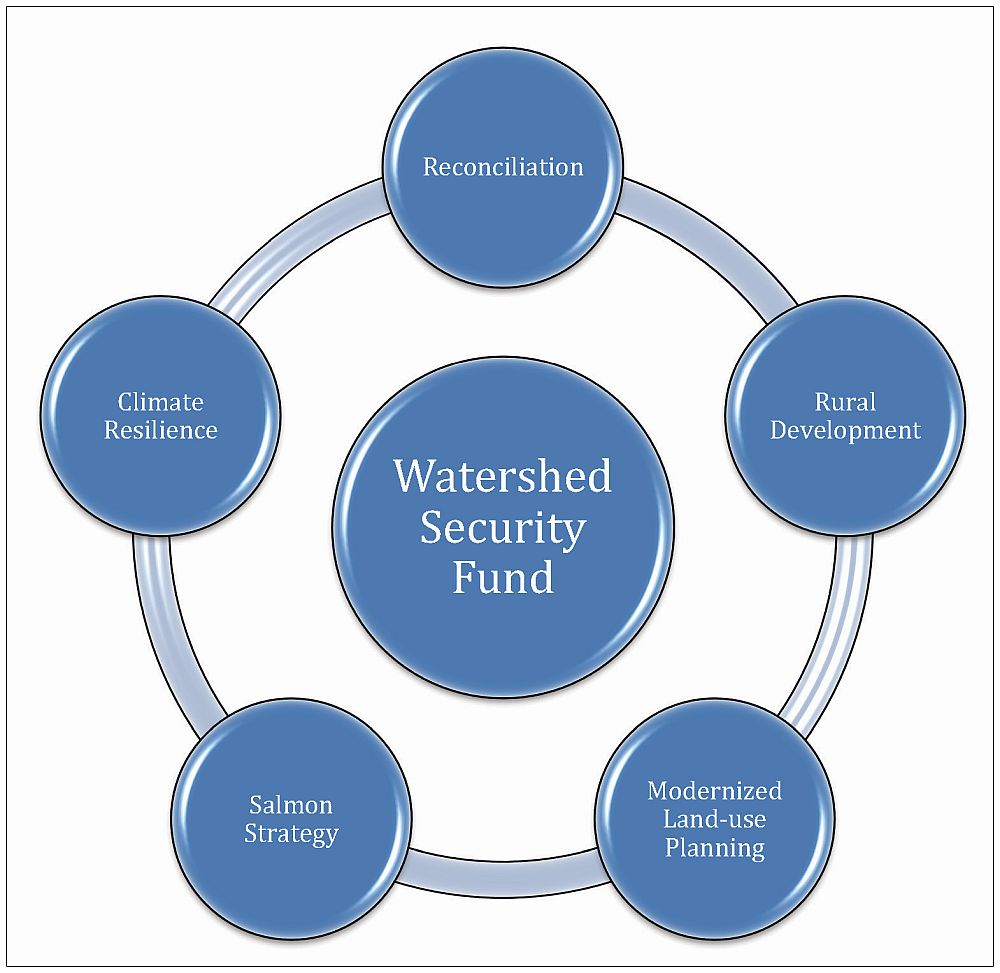TOWARDS WATERSHED SECURITY IN BRITISH COLUMBIA: A report on the role of water in modernized land use planning by the University of Victoria’s POLIS Water Sustainability Project (July 2020)
Note to Reader:
In this edition of Waterbucket eNews, we celebrate the commitment, hard work and perseverance of individuals who are striving to make a difference for the common good vis-à-vis land and water management in British Columbia. Below, we feature Towards Watershed Security, a report by Oliver Brandes and his team at the POLIS Water Sustainability Project at the University of Victoria.

TOWARDS WATERSHED SECURITY: “We outline the most important elements of a modernized provincial land and water planning framework to support success in regional and local planning efforts,” states Oliver Brandes, Director at the POLIS Water Sustainability Project, University of Victoria
For almost two decades, Oliver Brandes has been a passionate, provocative and tireless advocate for a 21st century approach to water management in British Columbia. In the latest report from the POLIS Project, Oliver and his co-authors address the role of water in modernized land use planning at a provincial scale.
Their spotlight is on what happens outside the local government setting. Of relevance to the work of the Partnership for Water Sustainability, the POLIS report helps make the case for reconnecting hydrology and ecology in altered landscapes, so that communities would adapt the built environment to a changing water cycle.
The POLIS team offers an extensive review of past and current land use planning efforts and draw clear conclusions on the future of water and land management and governance in B.C. They address the provincial government’s mandate and commitment to modernize land use planning and its linked priorities of reconciliation, rural economic recovery, water security, and climate adaptation.
The authors present a land use planning framework with six explicit design elements that they suggest can be adapted and tailored to specific regional planning contexts; and support a shift from the transactional and crisis driven planning of past decades to an integrated and comprehensive approach.

Role of Water in Modernized Land Use Planning
Towards Watershed Security: the role of modernized land use planning in British Columbia, was released in the summer of 2020,a time of unprecedented crisis. The pandemic and ensuing economic chaos placed increased pressure on local governments who, for almost a decade, have been burdened with managing the effects of prolonged droughts, damaging floods, and vulnerable drinking water sources.
Land-Water Nexus
“The goal of a renewed and modernized approach to integrated provincial planning is to help address real issues on the ground and in the water, achieve multiple economic, social, and sustainability benefits, and, critically, to prevent future problems, reduce conflict, and save money,” says Oliver M. Brandes, Director at the POLIS Water Sustainability Project, University of Victoria.
“ The way land and water are used, governed, and stewarded is often at the nexus of these persistent challenges. Our research offers insights and specific actions for a modernized land and water planning regime in British Columbia that would help secure the long-term health and prosperity of communities.
The way land and water are used, governed, and stewarded is often at the nexus of these persistent challenges. Our research offers insights and specific actions for a modernized land and water planning regime in British Columbia that would help secure the long-term health and prosperity of communities.
“In particular, we outline the most important elements of a modernized provincial land and water planning framework to support success in regional and local planning efforts.”
Watershed security is linked to a suite of existing Provincial mandates and priorities related to land, economy, and reconciliation:

Regional and Local Planning Context
Renewed Provincial Commitment
“In the past decade, land and water planning by the provincial government have advanced in fits and starts. Plans were often developed in response to conflict and litigation by Indigenous Nations or by local governments and authority holders seeking to fill planning gaps” says Rosie Simms, co-author of the Direction Paper. “While these plans are highly local and fit for purpose, they lack provincial authority and resources making them challenging to enforce.”
 “Recently, British Columbia entered a period of rapid innovation and change. A renewed provincial commitment to planning and range of new government-to-government planning approaches between First Nations and the province, such as the Klappan Plan and Nicola watershed pilot memorandum of understanding to emerging effort, are already demonstrating what is possible in a modernized and integrated land use planning regime,” concluded Simms.
“Recently, British Columbia entered a period of rapid innovation and change. A renewed provincial commitment to planning and range of new government-to-government planning approaches between First Nations and the province, such as the Klappan Plan and Nicola watershed pilot memorandum of understanding to emerging effort, are already demonstrating what is possible in a modernized and integrated land use planning regime,” concluded Simms.
A Conceptual Framework for Moving Towards Watershed Security in B.C.
Towards Watershed Security outlines why and how water must be explicitly integrated into B.C.’s land use planning framework as central to a modernized regime. The proposed framework consists of six design elements to be incorporated in individual local or regional land use plans:
- Attention to Governance, United Nations Declaration on the Rights of Indigenous Peoples (UNDRIP), and Capacity Building.
- Planning in a Phased and Adaptive Process.
- Considering Water in all Plans and Making Water Protection the Planning Priority in High-Risk Watersheds.
- Determining Plan Scale and Scope According to the Risk and Complexity of Issues.
- Deploying Crown Legal and Policy Tools While Recognizing Indigenous Laws and Structures of Authority in the Broader Regime.
- Adequate Resourcing.”
Addressing these interlinked challenges demands deep systemic shifts in how land and water are used, managed, and shared.
Quotable Quotes
“ Watershed plans will be an important component of water protection and conservation. The evolution of integrated land and water thinking will be complemented by the laws, particularly water law, that are being codified by First Nations. Indigenous laws will provide both legal strength and holistic considerations to ensure that water quality and quantity are protected into the future. Regional planners are looking to First Nations wisdom to be an integral part of planning from now on,” concluded Gwen Bridge, co-author of the Direction paper and Chief Executive Officer of Gwen Bridge Consulting.
Watershed plans will be an important component of water protection and conservation. The evolution of integrated land and water thinking will be complemented by the laws, particularly water law, that are being codified by First Nations. Indigenous laws will provide both legal strength and holistic considerations to ensure that water quality and quantity are protected into the future. Regional planners are looking to First Nations wisdom to be an integral part of planning from now on,” concluded Gwen Bridge, co-author of the Direction paper and Chief Executive Officer of Gwen Bridge Consulting.
 “Local governments and Indigenous nations bring valuable local knowledge to land use planning. New and emerging plans initiated at the local level, such as the Kettle River Watershed Management Plan, exemplify a whole-of-watershed approach which recognizes the interconnected relationship between land use practices and watershed security. To ensure these plans are appropriately implemented and monitored, the provincial government must adopt a modernized land and water planning framework that provides adequate resourcing while recognizing Indigenous law” added Lisa Matthaus, Provincial Lead with Organizing for Change.
“Local governments and Indigenous nations bring valuable local knowledge to land use planning. New and emerging plans initiated at the local level, such as the Kettle River Watershed Management Plan, exemplify a whole-of-watershed approach which recognizes the interconnected relationship between land use practices and watershed security. To ensure these plans are appropriately implemented and monitored, the provincial government must adopt a modernized land and water planning framework that provides adequate resourcing while recognizing Indigenous law” added Lisa Matthaus, Provincial Lead with Organizing for Change.

